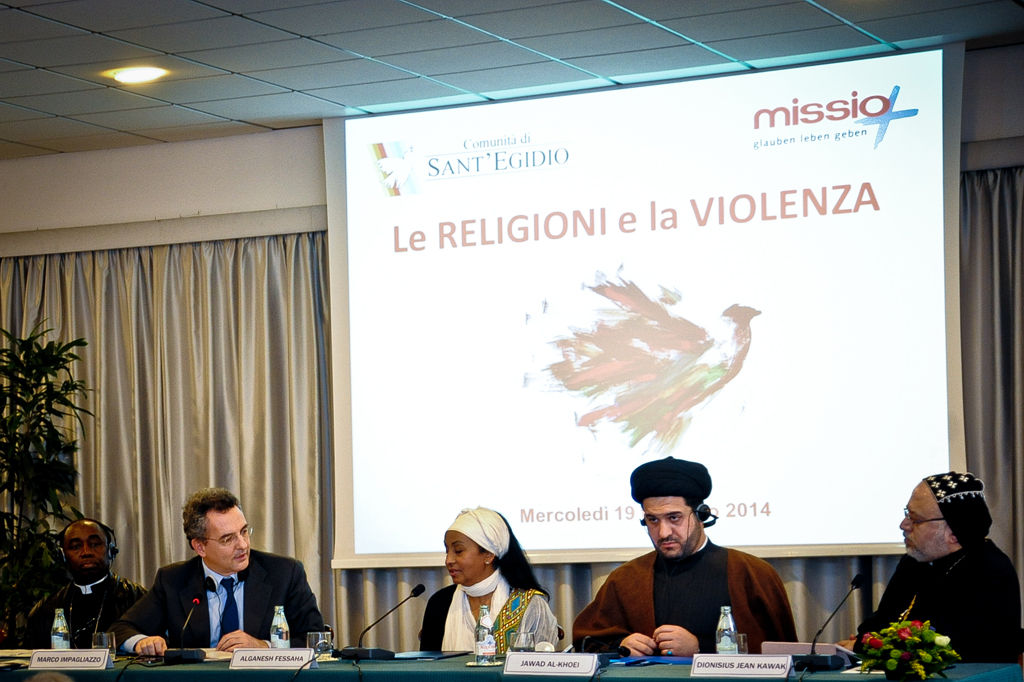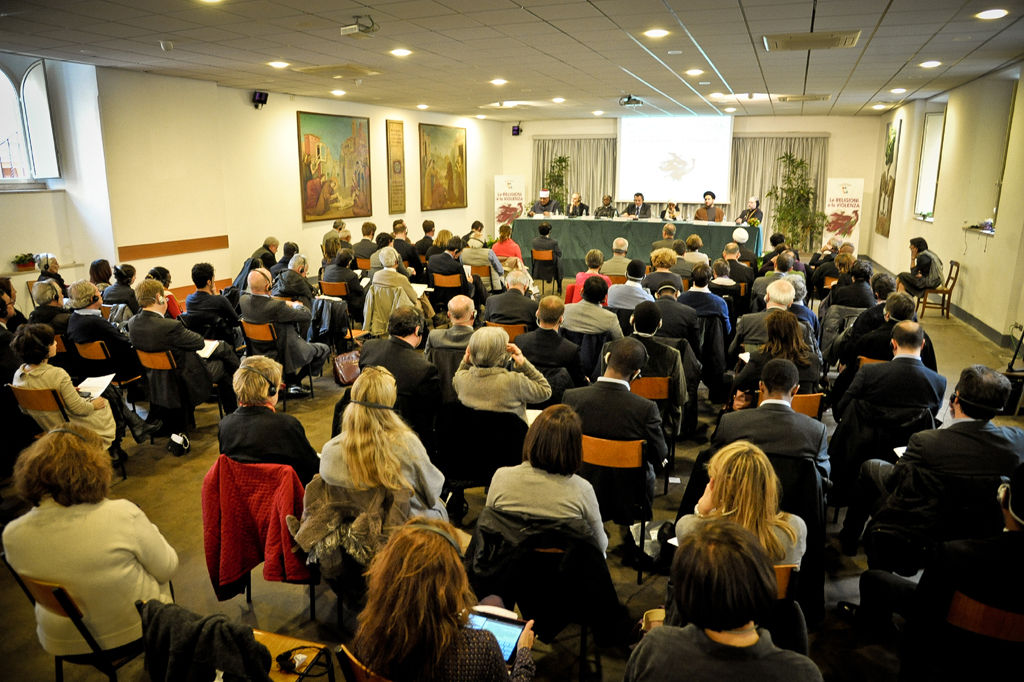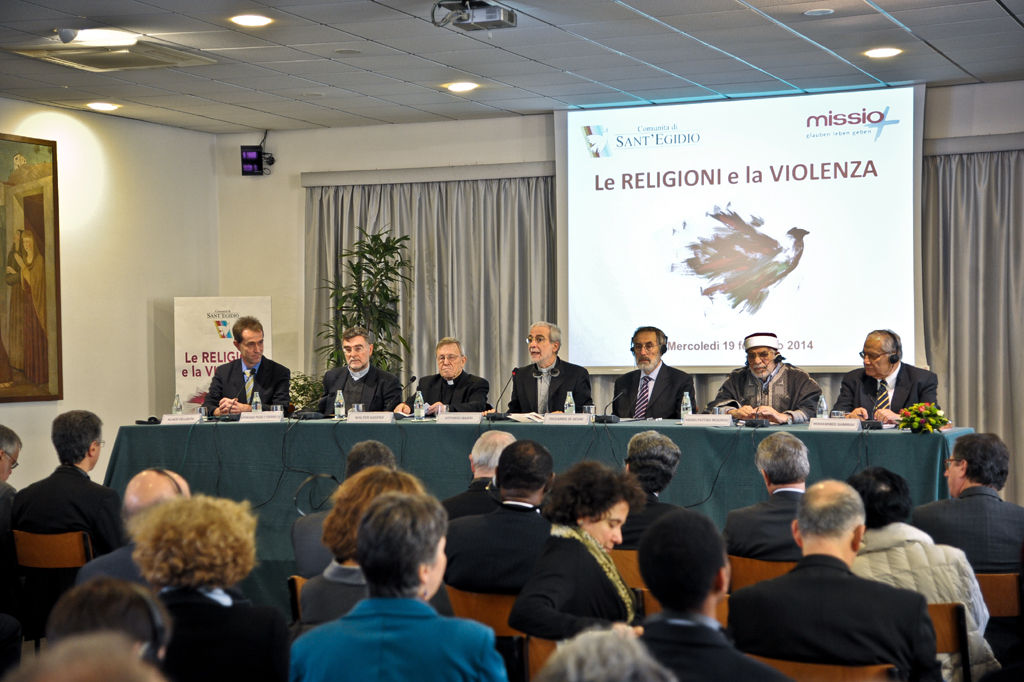 A "common pact" of religions, cultures and diplomacy to eradicate violence and build peace in the world. It is the appeal around which were gathered president of the Community of Sant'Egidio Marco Impagliazzo and US State Department diplomat Jerry White, a recognised leader in the international campaign against landmines that received the Nobel Peace Prize of 1997, during the international conference "Religions and violence" organised by Sant'Egidio yesterday, which saw the participation of religious personalities, of politics, of the diplomacy of Europe, Asia, Africa and the Middle East. "To achieve the goal of peace in the post-ideological globalised world where we live - noted Impagliazzo – traditional diplomacy needs new tools involving all dimensions of life: religion in the first place, then politics, culture, the fight against underdevelopment. The entire civil society must be engaged in an effort to overcome old suspicions or even real conflicts that are at the origin of the outbreaks of violence and terrorism that bloodied the world at the beginning of the third millennium". Parallel consideration that of Jerry White: "The traditional diplomacy has discovered how religions can contribute to the construction of an 'ecosystem' of peace by injecting the virus of peace in a world infected by “an epidemic of violence”: it is the “indirect diplomacy” that President Obama tries to use in the most delicate situations. A "common pact" of religions, cultures and diplomacy to eradicate violence and build peace in the world. It is the appeal around which were gathered president of the Community of Sant'Egidio Marco Impagliazzo and US State Department diplomat Jerry White, a recognised leader in the international campaign against landmines that received the Nobel Peace Prize of 1997, during the international conference "Religions and violence" organised by Sant'Egidio yesterday, which saw the participation of religious personalities, of politics, of the diplomacy of Europe, Asia, Africa and the Middle East. "To achieve the goal of peace in the post-ideological globalised world where we live - noted Impagliazzo – traditional diplomacy needs new tools involving all dimensions of life: religion in the first place, then politics, culture, the fight against underdevelopment. The entire civil society must be engaged in an effort to overcome old suspicions or even real conflicts that are at the origin of the outbreaks of violence and terrorism that bloodied the world at the beginning of the third millennium". Parallel consideration that of Jerry White: "The traditional diplomacy has discovered how religions can contribute to the construction of an 'ecosystem' of peace by injecting the virus of peace in a world infected by “an epidemic of violence”: it is the “indirect diplomacy” that President Obama tries to use in the most delicate situations.
 At the bottom, there is the consideration of another speaker of the conference, Catalan theologian Armand Puig, dean of the faculty of theology of Barcelona: "Violence can never be justified, and therefore it always needs justification. Peace, however, does not need to justify itself, must not ask permission to enter the paths of history". At the bottom, there is the consideration of another speaker of the conference, Catalan theologian Armand Puig, dean of the faculty of theology of Barcelona: "Violence can never be justified, and therefore it always needs justification. Peace, however, does not need to justify itself, must not ask permission to enter the paths of history".
The conference started with a consideration not optimistic: "In recent years, religious violence has increased strikingly" said cardinal Walter Kasper, president emeritus of the Pontifical Council for Promoting Christian Unity, and this was because "those that belong to all religions, including Christians, that is, people or groups that claim to act in the name of a religion or of Christianity have been or are advocates of violence". So religion is the victim and the author of violence at the same time; yet "world peace is not possible without peace among religions" and without faiths promoting their common features in terms of human rights, religious freedom, tolerance, mercy and forgiveness, breaking the "vicious circle of violence that begets violence".
Under these circumstances a diversified approach has inserted. The massacre of the Twin Towers, at the beginning of the twenty-first century, for example, was recalled by chief rabbi of Rome Riccardo Di Segni as the image of a "violence coloured of religiosity", as if religions "can be violent in principle". Soon afterwards, Abdelfattah Mourou, vice president of the movement Ennahdha, who won the elections in Tunisia and is the author of the new Constitution, one of the ripest fruits of the Arab Spring, has instead argued that violence, including that between the States, "preceded religion" and maybe it has used it; and therefore it is the duty of religions to recover their autonomy and contribute to peace-building nurturing culture, values and education.
 Similarly, Muhammad Khalid Masud, a member of the Supreme Court of Pakistan, denies that religion is "part of violence" although he acknowledges that "it can be used to justify violence" and therefore it should strive "to clarify this confusion" building a Similarly, Muhammad Khalid Masud, a member of the Supreme Court of Pakistan, denies that religion is "part of violence" although he acknowledges that "it can be used to justify violence" and therefore it should strive "to clarify this confusion" building a
"new theology in support of cooperation between States in place of the domain of one over another”.
Lebanese Samir Franjieh, an intellectual and a former member of parliament in Beirut, argued that "religions, despite their differences, have a common mission: to make understand men that they are condemned to cooperate together to survive, and that the relations between them is not an option to choose or refuse but a necessity to recognise”. Indian writer Sudheedra Kulkarni insisted on the combination of traditional spirituality and modern technology for education for peace of younger generations, the Syriac Orthodox Archbishop of Syria Dionisius kawak launched an urgent appeal so as to fulfill "any effort to stop violence and fight to put an end to the chaos, in order to avoid the defeat of all Syrians"; and Anglican Bishop of Jos in Nigeria Benjamin Kwashi brought a direct evidence of the role that interreligious dialogue, not only at the level of the summits of Churches but also of the people and of the different levels of society, can play in addressing and resolving situations of dramatic violence like the one that hits his country.
|

